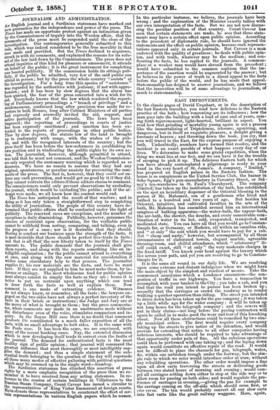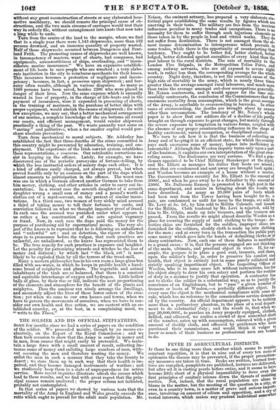EASY IMPROVEMENTS.
IN the classic pages of David Urquhart, or in the description of the last Eastern traveller, you read how delicious is the Eastern practice of the bath ; how renovating are its influences ; how the man goes into the building with a load of care and of years, com- ing forth rejuveneseent, light-hearted, brilliant in aspect. You read how that grinding of mortality young again is not a process like the immortalizing of Triptolemus, irksome, agonizing, and dangerous, but in itself an exquisite pleasure, a delight giving a foretaste of heaven ; and throwing down the book, you cry, that you will travel to the East, for the express purpose of enjoying a. bath. Undoubtedly, numbers have formed that resolve and the incident is an exact parable of what happens every day of our lives. We determine to make some grand expedition when the thing we want lies at our feet, and we can have it for expedition, trouble of stooping to pick it up. The delicious Eastern bath for which you have already contemplated a pilgrimage is ready to your hand in the very heart of St. James's. A company, "limited," has prepared an English palace in the Eastern fashion. The house is as conspicuous as the United Service Club, the bazaar in Soho Square, Egg's gun-manufactory in Coventry Street, or Sid - ney's tea-warehouse in St. Paul's Churchyard. The company (limited) has taken up the institution of the bath, has established on the spot an hereditary, dispenser of the Oriental blessing in the person of Mr. Mahomed., son of a gentleman who lived and bathed to a hundred and two years of age. But besides his Oriental, intuitive, and cultivated faculties in the arts of the bath, Mr. Mahomed has assembled around him an international congress of bathing apparatus—the water-bath, the vapour-bath, the air-bath, the shower, the douche, and every conceivable com- bination of water in its hot, cold, evaporated transjeoted, and medicated state. You can have all that you would go to Constan- tinople for or Germany, or Madeira, all within an omnibus ride, and "at Only " the cost which you would have to pay for a cab. Not "cheap and nasty," however, but accompanied by all those circumstances of elaborated towels, elegant marble, agreeable dressing-room, and skilful attendance, which "aristocracy" it- self could exact, still " at only" the very moderate charges in the fixed_tariff. You knock your head against the luxury which lies across your path, and yet you are resolving to go to Constan- tinople for it. It is the same all round in our daily life. We are resolving upon some extreme and distant indulgence when we might have the main object by the simplest and readiest of means. Take the commonest annoyance which a Londoner encounters—the con- gestion of traffic in our highways. You have a transaction to accomplish with your banker in the City ; you take a cab, and you find that the road you intend to pursue has been broken up ; secondly that the carriages so crowd the roadway as to render walking a quicker operation than riding. The street you intended to drive down has been taken up for the gas company ; it was taken up a little while ago for the water company; it will be taken up not long hence for the telegraph company ; and the sewers will put in their claims—not long before the paving contractors will again be called in to make good the wear and tear of this knocking about. Now all these obstructions could be remedied by two sim- ple municipal orders. The first would require every company taking up the streets to give notice of its intention, and would provide for extending that notice to all other companies having subvious interests, who should be required to take advantage of that opportunity under pain of fine. All the subvious operations could then be performed with one taking up ; and the laying down again would constitute an effective repair of the road. It would not be difficult to place the channels for gas telegraph, water, &c. within one unbroken trough under the footway, but the sim- ple rule to which we refer would introduce order at once, without any rebuilding operations. The other order would impose a fine upon all slow carts traversing the streets or delivering goods between two stated hours of morning and evening ; would com- pel all carriages setting down either to stop at the side way or to allow room for passing on both sides; and would regulate the pre- ference of carriages in crossing,—giving the pas for example to the carriage coming on the off-side which should cross first, or vice versa. The tax would probably convert all our slow carts into fast carts like the great railway waggons. Here, again, without any great reconstruction of streets or any elaborated loco- motive machinery, we should remove the principal cause of ob- structions, and the two main streams of carriages would trot their way in orderly file, without entanglement into knots that now take a lcmg while to undo.
Turn from the centre of the land to the margin, where we find that in a single year there were 1,143 shipwrecks, more than 632 ns drowned, and an immense quantity of property wasted. persons drowned, these shipwrecks occurred between Dungeness and Pent-
land Frith. The promoting causes of shipwrecks are well known, in incompetency of masters, want of charts, bad compasses, bad equipments, unseaworthiness of ships, overloading, and " incon- erste marine insurances." We have an expensive establish- ment of life boats to save people who are wrecked ; a very elabo- rate institution in the city to reimburse merchants for their losses. This insurance becomes a protection of negligence and incom- petency; becomes, in fact, a premium upon shipwreck ; and bar- ratry often results, although in various disguises. As many as 1668 persons have been saved, besides 2206 who were placed in danger of their lives. Now the same expense which is annually wasted in loss of property, in the charge of life-boats and in the payment of insurances, were it expended in procuring of charts, an the training of mariners, in the purchase of better ships with proper equipment, would abolish the causes of shipwreck ; for with few exceptions, we may say, that a better mechanical arrangement of our marine, a complete knowledge of the sea bottoms all round our coasts, and, efficient management, would render shipwreck practically a thing of the past. We waste annually vast sums on "saving' and palliatives, when a far smaller capital would pur- chase absolute prevention. TIIII1 from mechanical to moral subjects. Mr. Adderley has established the fact that three-fourths of the crime committed in this country might be prevented by education, training, and em- ployment. The experience of the Irish convict system establishes these representations e converse. Our retributive corrections as- sist in keeping up representations, offence. Lately, for example, we have
discovered one of the periodic paroxysms of fortune-telling, by which the less instructed orders of society dupe each other. It is a kind of offence easily charged, not always proved, but when proved feasible only by an easiness on the part of the dupe which almost amounts to participation in the offence. The worst ease was one in which a German allowed another German to take from him money, clothing, and other articles in order to carry out in- cantations. In a recent case the seventh daughter of a seventh daughter wrung a small sum of money and a pound's worth of clothes out of a maid-servant, on the pretext of similar incan- tations. In a third case, two women of very sickly mind accused a third of taking money to tell their fortunes by cards and ecmviction followed on what we thought imperfect proof of Laud. In each case the accused was punished under what appears to us rather a lax construction of the acts against vagrancy or fraud. Now, in each case the dupe paid the money for the purpose of purchasing aid by supernatural means. The very ob- ject of the knave is to represent that he is following an unhallowed and "unlawful" art ; and on detection, the rigour of the law steps in to pronounce before the vulgar, that such practices are unlawful, are unhallowed, as the knave has represented them to be. The true remedy for such practices is exposure and laughter. Let the penalty for patronizing wizards and witches be the loss of money and derision; by which last "the black art is more likely to be exploded than by all the terrors of the tread-mill.
Many a modern philosopher has in his own room a large glass box filled with sea-water, in which he keeps in prolific health a hand- some brood of zoophytes and plants. The vegetable and animal inhabitants of the tank are so balanced, that there is a constant and equitable interchange of oxygen and hydrogen. Little hollow balls of glass by their rise or fall, indicate the neat proportioning of the elements and atmosphere for the benefit of the plants and zoophytes. Thus the amateur can nicely arrange the dwellings, and accurately adjust the lives of these lower orders of the crea- tion; yet when we come to our own houses and towns, when we have to govern the movements of ourselves, when we have to con- sider our own health and free action, we are content with an es- tablished anarchy, or, at the best, in a complaining mood, we "write to the Tunes."



































 Previous page
Previous page